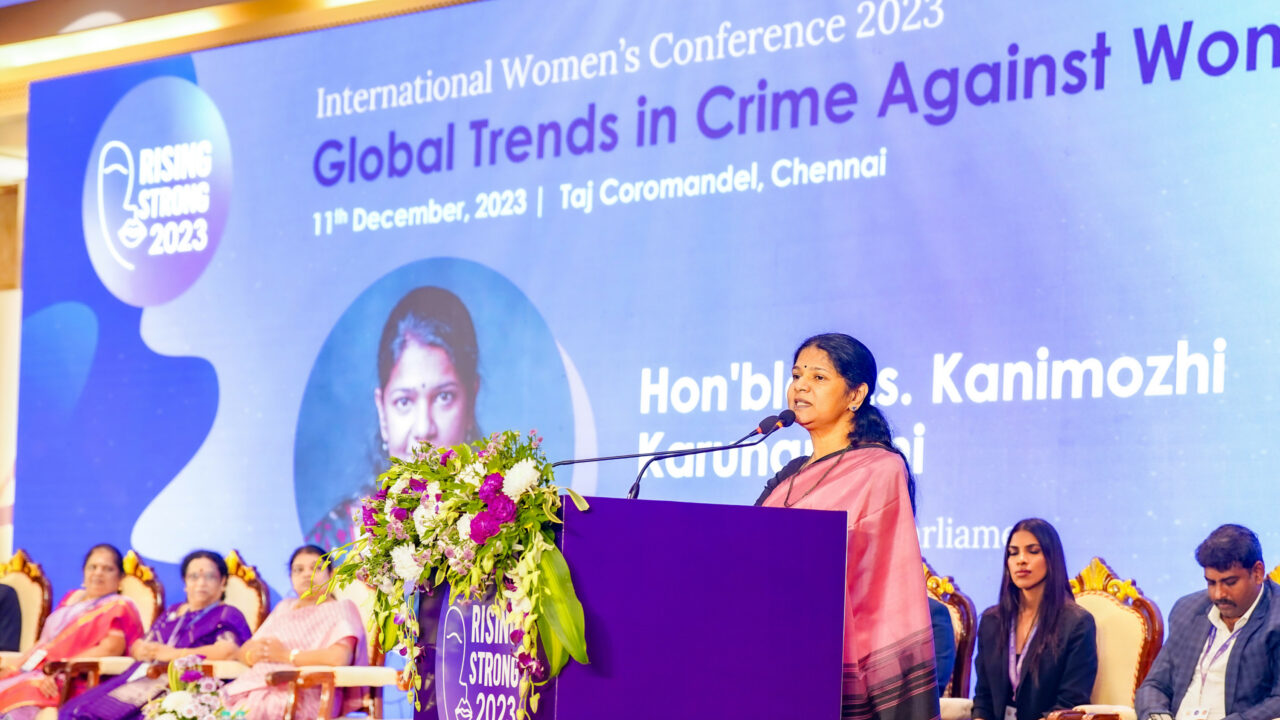International Conference Tackles Global Trends in Crimes Against Women
Violence Against Women & Children
TAMIL NADU, INDIA — For the first time in Tamil Nadu, IJM and the State Commission for Women (TNSCW) jointly organized an international conference on “Global Trends in Crimes Against Women” on December 11, 2023. The one-day event brought together nearly 500 esteemed government officials, global thought leaders, social activists, and students to discuss evolving forms of violence against women and children. This diverse forum provided an opportunity for experts to explore local and cross-border collaboration, share best practices, and discuss innovative solutions that will help keep women and children safer.
The conference sessions focused on critical topics: the reality and impact of violence against women, emerging trends seen in human trafficking, forced labor and online crimes against women, and available Indian and international laws, strategies and best practices to combat such crimes.
Christopher Hodges, Consul General from the US Consulate General Chennai, was a special guest at the conference. He shared in his thought-provoking speech, “These are not women’s rights that we are discussing. They are human rights—the right to safety from sexual and physical violence, harassment and danger, the right to exist as a fully valued and equal member of your community and the security in knowing that you will not be attacked including by your family members, spouse, or coworkers simply because of who you are.”
Survivors Voice their Requests
The international conference provided a significant platform for survivors of labor exploitation, commercial sexual exploitation, violence and abuse against women and transgenders to share their views in the presence of leaders from across the world.
Survivor leaders from the Global Survivor Network—namely Pachaiyammal and Kashi from India, Josephine from Ghana and Victoria from Uganda—and also Kalaimamani Sudha, who is a transgender survivor from India, shared about their lives before and after abuse. They collectively appreciated their local governments for freeing them from violence and exploitation and expressed the need for governments and officials to include them in policy-making discussions.
Pachaiyammal said, “We used to be working [as victims of bonded labor] for owners but today we are entrepreneurs and owners. It is purely because of the government. You all are here from different countries and states. I am sure there are many survivors/women in your country as well. Make them join local committees, listen to them and provide opportunities for them to present their stories and asks. This is my humble request.”
Recommendations for Change
Based on the day’s discussions, IJM helped assemble the following list of recommendations and presented it to the Tamil Nadu State Commission for Women:
- Awareness and sensitization programs: Increase awareness and sensitization programs at schools, corporate houses, governments, establishments and also for policymakers and the community at large. Increase awareness among boys and men in order to transform social norms.
- Rehabilitation: Set up recovery homes with access to trauma-informed counselling care for survivors to heal safely.
- Improved implementation of the law: Officials are to be informed on the international legal provisions, infrastructure, challenges and best practices. With this knowledge and a victim-centric approach, officials will be able to effectively address crimes against women.
- Special task forces: Set up women and child-friendly infrastructure to help increase reporting of crimes.
- Collaborative approach: Work with local, national, and international officials and social action groups to nab criminals, increase deterrence and bring victims to safety.
- Technology integration: Develop and implement advanced technology-based tools and strategies to prevent, detect and combat emerging crimes against women, especially in the digital sphere.
- Survivor’s voices: Before rolling out policies, discuss with survivors. Their experience and opinions will help create robust policies that will help protect women and prevent crimes. Consult with survivors when creating and implementing policies. Collaborate with survivors to build lasting change.
- Inclusive growth: Make relevant exceptions and reservations for survivors. Connect with local survivors, hear them out and provide opportunities for their well-being and development.
Another Step Towards Ending Everyday Violence
The one-day event helped unravel some of the complex attributes of the crimes against women, sparked discussions and highlighted the need to work more collaboratively with one another. It is significant to note that esteemed leaders from the state and experts from around the globe had gathered together under one roof for a focused discussion on addressing crimes against women.
The conference not only addressed the issue but also provided space for relationship-building and future collaborations with local and global power actors, bringing us all one step closer to ending violence in our lifetime.
Fueled with hope for the future, Honorable A. S. Kumari, Chairperson of the TNSCW, expressed, “We are rising strong across the globe. Friends, no force can stop this storm or the fire we ignite today at this conference in Chennai. This should echo to the rest of the world – that we are rising strong.”